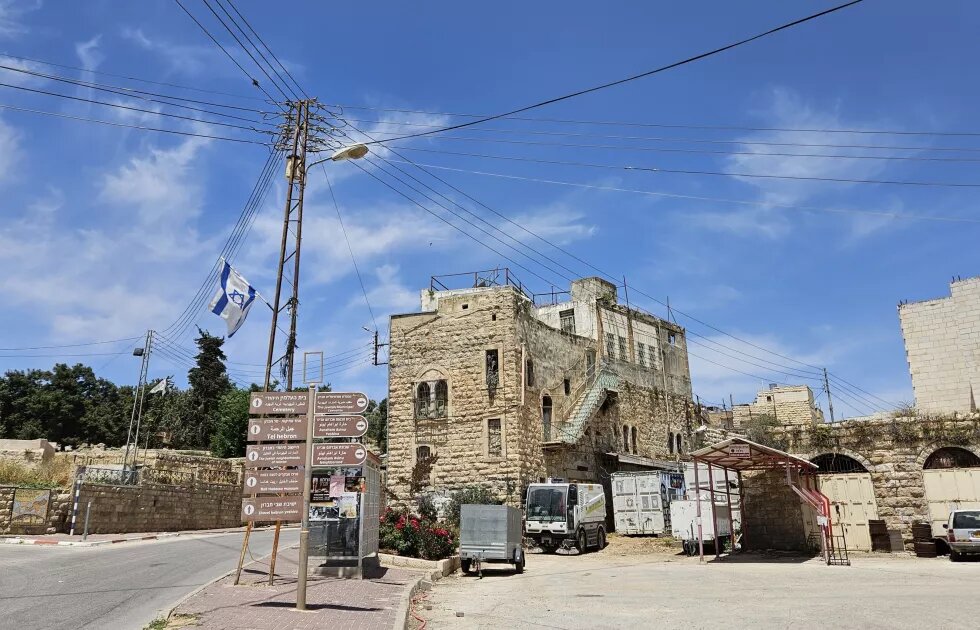

The Heinrich Böll Foundation - Palestine and Jordan (hbs) hosted a German Green Party delegation for a two-day visit to the occupied Palestinian territory (oPt) on 16-17 May 2023. The delegation included MP Agnieszka Brugger, Deputy Chairwoman of Alliance 90/The Greens Parliamentary Group, Coordinator of the "International Politics & Human Rights" Working Group and Member of the Defense Committee of the German Parliament; MP Jürgen Trittin, Spokesperson of Foreign Affairs, Member of the Foreign Affairs Committee and a Former Federal Minister of Environment; and Dr. Carsten Wieland, Senior Policy Advisor for the Middle East for the Greens’ Parliamentary Group.
The program organized by hbs started with a tour to Hebron, the second largest city in the West Bank, in coordination with the Palestinian non-violent activist movement Youth Against Settlements and the Israeli human rights organization Breaking the Silence. It included visits to Shuhada Street, former wholesale market, and the Ibrahimi Mosque area. The tour focused on the de jure and de facto annexation, settlement expansion, the Israeli military presence in the West Bank, restrictions on the movement of Palestinians and forcible transfer.
Next, the delegation travelled to Susiya in Masafer Yatta and received a briefing on the “Firing Zone 918”, forced evictions and transfer, demolitions and settlement expansion in the area. Masafer Yatta in the South Hebron Hills of the West Bank is home to twelve Palestinian villages with about 2,800 residents. The area is spread out over about 35,000 dunums[1] of land, where agricultural communities have lived for generations. In the 1980s, Israeli authorities designated parts of Masafer Yatta as a closed military zone "Firing Zone 918". Since then, residents have been at risk of forced eviction, demolition and forcible transfer. In May 2022, the Israeli High Court of Justice rejected a petition against the forcible displacement of the residents of Masafer Yatta, a decision that paves the way for the imminent plan to forcibly transfer more than 1,000 Palestinians, including 500 children.
In Susiya, the delegation met with local activist and human rights defender Nasser al Nawajaa, who gave a briefing on the human rights situation in Masafer Yatta, settler violence and the forceful displacement of Palestinians from the area. The discussion also touched on European and German humanitarian and political support to Palestinians in “Area C” of the West Bank, especially in Masafer Yatta, in face of the ongoing displacement and settlements’ expansion.
In the late afternoon, the delegation met with Palestinian Prime Minister Dr. Mohammed Shtayyeh in Ramallah and discussed with him the sociopolitical and human rights situation and recent development in the oPt as well as Palestinian presidential and parliamentary elections and how the PA views recent regional development and their impact on the Palestinians.
The first day of the visit was concluded with a dinner roundtable with some of hbs’ partner organizations and affiliated local experts. The open discussion focused on the current political and human rights situation and recent developments in the oPt, the new Israeli government and the proposed judicial overhaul and its impact on Palestinians, and an in-depth and from the ground sociopolitical and economic analysis of the Palestinian local situation.
The second day of the visit started with a meeting with UNRWA high officials in Jerusalem to discuss the current political and humanitarian situation and latest sociopolitical developments in the oPt, the work of UNRWA, its services and the challenges it is facing, and Germany’s role in supporting UNRWA.
The two-day visit to Palestine was concluded with a briefing with Mr. Itay Epshtain, Senior Humanitarian Law and Policy Consultant and Special Advisor at the Norwegian Refugee Council. Mr. Epshtain gave a brief on the current political and security developments from an international law perspective and provided an analysis on the impact of Israel’s proposed judicial overhaul on Palestinians.
[1] A dunum is an Ottoman unit of area that is equivalent to a hectare or 1,000 square meters.

